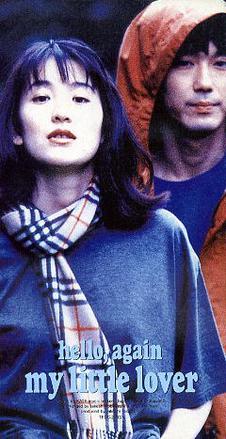
A music download is the digital transfer of music via the Internet into a device capable of decoding and playing it, such as a personal computer, portable media player, MP3 player or smartphone. This term encompasses both legal downloads and downloads of copyrighted material without permission or legal payment. According to a Nielsen report, downloadable music accounted for 55.9 percent of all music sales in the US in 2012. By the beginning of 2011, Apple's iTunes Store alone made US$1.1 billion of revenue in the first quarter of its fiscal year. Music downloads are typically encoded with modified discrete cosine transform (MDCT) audio data compression, particularly the Advanced Audio Coding (AAC) format used by iTunes as well as the MP3 audio coding format.
W-inds is a Japanese pop boy band managed by Vision Factory and signed to the Pony Canyon label since 2000. The group consists of Ryohei Chiba and Keita Tachibana; Ryuichi Ogata left the group in 2020. Tachibana is the lead singer of the group, while Chiba and Ogata provide backing vocals and rap.

Japanese singer Ayumi Hamasaki has released eighteen studio albums, five compilation albums, twenty-six remix albums, four live albums and numerous singles and promotional singles. She debuted in 1995 under Nippon Columbia with the stage name Ayumi, releasing an extended play Nothing from Nothing, which was a collaboration with Dohzi-T and DJ Bass. Three years later, Hamasaki debuted again as a singer under Avex Trax with the single "Poker Face" (1998). Her first album A Song for ×× (1999) debuted at number one on Oricon's albums chart, and sold over 1.4 million copies.

The discography of Japanese-American R&B and pop singer Hikaru Utada consists of eleven studio albums, three compilation albums, eleven video albums and numerous singles and promotional singles. Utada began as a musician in the early 1990s as a member of U3, a family unit made up of her, her mother Junko Utada, also known as 1970s enka singer Keiko Fuji, and her father, musical producer Teruzane Utada. U3 released their debut album Star in 1993, with the hope to debut in America. In 1996, the group was rebranded as Cubic U, an R&B project focusing on Hikaru Utada, resulting in the English language album Precious in 1998 with record label Toshiba EMI.
"This Is Love" is Hikaru Utada's first Japanese digital single. It was released on May 31, 2006 as a promotional single for her fourth Japanese studio album. "This Is Love" was tied-in as the CM song for a Nissin cup noodle campaign and the opening theme for an anime "Freedom," which was also tied into the Nippon campaign. The digital single reached number one in virtually every online music store in Japan prior to the ULTRA BLUE album's release, including the most used store in Japan, iTunes Japan, as well as OnGen, among others. Utada herself is quoted to have said that this song is about expressing that "Love is like a mix of extremes: anxiety and peace."
The discography of Japanese pop singer Koda Kumi includes 17 studio albums, 2 cover albums, 10 compilation albums, 10 remix albums, 9 live albums and 57 singles. All of her Japanese musical releases have been with Rhythm Zone, a sub-label of Avex Group.

"Flavor of Life" is Hikaru Utada's 18th Japanese single. The physical single was officially released on February 28, 2007.

"Beautiful World" is a song by Japanese musician Hikaru Utada. It served as the theme song for Evangelion: 1.0 You Are (Not) Alone, the 2007 film reboot of the anime Neon Genesis Evangelion. It was released as a double A-side single on August 29, 2007 along with their song "Kiss & Cry", which had been released digitally three months earlier. In 2009, a remix of the song, "Beautiful World " served as the theme song of the second film in the series, Evangelion: 2.0 You Can (Not) Advance.
The discography of Ayaka consists of six studio albums, two compilation albums, a cover album and numerous singles, released through Warner between 2006 and 2009, and through Ayaka's independent label, A Station, from 2012 onwards.

"Prisoner of Love" is Hikaru Utada's 21st Japanese single and 30th single overall, and was released on May 21, 2008. This was her first Japanese recut single in nine years, after the first one "First Love" in 1999. It is also her first single to be released only in CD+DVD format. "Prisoner of Love" serves as the insert song for the Japanese television drama, Last Friends, while the original version is used in the opening theme. It won the Best Theme Song Award in the 57th Drama Academy Awards. "Prisoner of Love" was the 3rd most downloaded song in Japan during 2008.

"Sorafune"/"Do! Do! Do!" is a double A-side single by the Japanese boy band Tokio, released on August 23, 2006. It is the thirty-sixth release for the group, and also has been their most commercial successful effort after their 1995 best-selling debut single "Love You Only".
SoulJa is a Japanese hip-hop musician and songwriter best known for his collaborations with singer Thelma Aoyama, "Koko ni Iru yo" and "Soba ni Iru ne" – the latter of which was the former Guinness World Records holder for the best selling digital single of all-time in Japan.

The discography of Japanese musician Kaela Kimura consists of eleven studio albums, two compilation albums, one cover album, three extended plays, twenty-eight singles and five video albums. She debuted as a musician in 2004 under the label Columbia Music Entertainment, releasing ten albums with the company. In 2013, Kimura released Rock, an album of English language covers under her private label Ela Music. In 2014, Kimura released "Ole! Oh!", her first single under Victor Entertainment.

Suki de, Suki de, Suki de./Anata dake ga(好きで、好きで、好きで。/あなただけが / Love, Love, Love./Only you) is a single by Japanese R&B/pop singer Koda Kumi. It is a concept single, featuring three different ballads with three different music videos. The B-side of the single, walk ~to the future~, is a re-arrangement of walk from Kumi's 2002 debut album, affection.

"Hello, Again " is a song by Japanese band My Little Lover. It was released as a single on August 21, 1995, and is currently the band's biggest hit single.

"Hotaru/Shōnen" is the twenty-sixth single by Japanese artist Masaharu Fukuyama. It was released on 11 August 2010.

"Break It/Get Myself Back" is a double A-side single released by Japanese recording artist Namie Amuro. It was released on July 28, 2010, through Avex Trax. Break It was used in a Coca-Cola Zero commercial. The song reached number three on Oricon's weekly chart. The single has been certified Gold for shipment of 100,000 copies, as well as "Get Myself Back" being certified as a gold download to cellphones., it serves two lead singles for her tenth studio album Uncontrolled.

"Ai o Komete Hanataba o" is a song by Japanese pop-rock act Superfly. Used as Edison no Haha's theme song, "Ai o Komete Hanataba o" was released as the band's fourth single on February 27, 2008. The song was Superfly's break-through single, breaking into the Oricon physical singles chart's top 20. As of 2011, it is Superfly's most successful single, being certified as a million ringtone download, triple platinum as a cellphone download, and single platinum for digital sales.
The discography of Japanese pop and jazz vocalist Juju consists of six studio albums, four tribute albums, two extended plays, two live albums, five video albums and numerous singles. Juju debuted as a singer in 2001, collaborating with artists such as DJ Masterkey, Spontania and worked on the soundtrack for the film Kyōki no Sakura.











